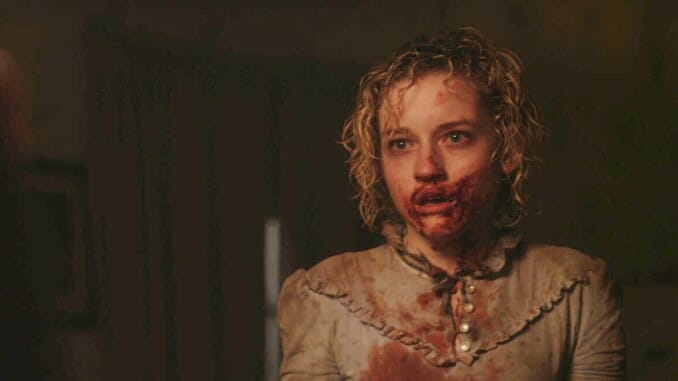
Paste’s ABCs of Horror 2 is a 26-day project that highlights some of our favorite horror films from each letter of the alphabet. The only criteria: The films chosen can’t have been used in 2019’s Century of Terror, a 100-day project to choose the best horror film of every year from 1920-2019, nor last year’s first ABCs of Horror project. With many heavy hitters out of the way, which movies will we choose?
The collective life of a family is a macrocosm, as subject to definitive, transformational moments as an individual life. It simply takes the right kind of sea change event, occurring at the right moment of indecision, to throw decades or even centuries of tradition, belief or faith to the wind, laying bare the creeping doubt and weakness at the heart of even the most close-knit community. This is the kind of crucial moment captured in Jim Mickle’s We Are What We Are—a remake of the 2010 Mexican film of the same name, but elevated via the intensity of some key performances. The choice faced by its family unit might be phrased as “change or die,” but it’s perhaps most accurately expressed as persist and perish.
We Are What We Are is the story of the Parkers, a reclusive and somewhat cloistered family whose lives revolve around routine, familial respect and frequent observances of religious ritual. As they begin a period of fasting in advance of an upcoming ritual, the family is shaken by personal tragedy by the sudden death of the mother figure, a key member of the household holding together the bonds between father Frank (Bill Sage) and children Iris (Ambyr Childers), Rose (Julia Garner) and Rory (Jack Gore). The question becomes: Without the steadying presence of their mother, will the younger generation of this family choose to preserve the way of life their father insists has kept their lineage going since the days of the pioneers? What if that way of life contains horrors that a modern mind can’t possibly hope to rationalize?
Perhaps fittingly, following the presence of Ravenous in this year’s ABCs of Horror countdown, we’re again talking about cannibalism here—but this isn’t the mystical, superhuman strength-imbuing cannibalism of that piece of historic Western horror, frothing with rabid energy and a supernatural aura. This is instead a considerably more naturalistic and disturbing presentation of ritualized cannibalism as a unit of religious dogma—a “necessary evil” that the family patriarch insists the family must perform on a yearly basis in order to keep their way of life alive. These people aren’t mindless ghouls; they’re a harshly structured and controlled family unit, raised in an environment where fealty to one’s elders is the ultimate expression of love and belonging. The youngest generation has been isolated, kept away from interaction with the rest of society lest they be tempted by the “modern” and sinful culture of which we’re all a part … a culture that just so happens to not involve ritual cannibalism. But when those kids come of age, what happens if they finally begin to question their own family’s history and oral tradition? What happens when they discover the possibilities of a life outside of their regimented existence?
This murky, gray area of fealty and personal loyalty is where We Are What We Are does its best work and unearths some spectacular performances. We understand quickly that father Frank Parker is gruff and potentially abusive, but the sheer betrayal of informing the outside world of family business is almost too heinous an act for eldest daughters Iris and Rose to even consider. Moreover, they’re mired in their own culpability—can a 17-year-old really still fall back on “I was only doing what my parents said?” when defending the abduction and butchering of a local resident? If the choice is between sharing a home with your father, or a jail cell with him, which would you choose? Childers and Garner dazzle as daughters torn between an emerging morality and self-preservation, while late, great American character actor Michael Parks has a stellar turn as a town doctor who begins to suspect the family had something to do with the prior disappearance of his young daughter. Subtle recrimination oozes in the exchanges between Sage and Parks as they converse, with neither wanting to tip their hand and confront what they suspect, while the threat of violence feels perpetually just over the horizon.
As fucked-up family horror dramas go, We Are What We Are captures some of the same sweaty, ecclesiastical fervor as Bill Paxton’s 2001 film Frailty, which is also about children who come to realize the horror of their station. We Are What We Are, though, drags even its would-be protagonists down into the grime, positing that even in the process of overcoming evil, we may be forever lost to it. It’s a gutsy, grisly combination of crime story and emotional horror catharsis, an intimate case study of family dysfunction driven by the changing times and the impracticality of the same archaic traditions that often sustain us. Look too closely, and you’ll end up questioning your own familial routine, and you may not like what you see.
Jim Vorel is a Paste staff writer and resident horror guru. You can follow him on Twitter for more film and TV writing.